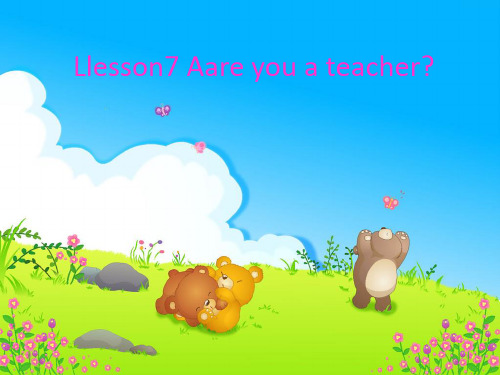Ryan's English charpt 7 动词概说
仁爱英语七年级下册U7T1 重点句型

4.What will you buy for Kangkang as a birthday present?你要给康康买什么礼物? 你要给康康买什么礼物? 你要给康康买什么礼物 动词原形” “will+动词原形”表将来。 动词原形 表将来。 5.I can play the guitar.
【上册】人教版九年级英语Unit7单词、词汇与句式

【上册】人教版九年级英语Unit7单词、词汇与句式Unit7单词license[ˈlaIsns]n.(=licence)证;证件safety[ˈseifti]n.安全;安全性smoke[sməuk]v.冒烟;吸烟n.烟part-time[ˌpɑ:(r)tˈtaɪm]adj.兼职的pierce[piəs][pirs]v.扎;刺破;穿透earring[ˈiəriŋ][ˈɪrɪŋ]n.耳环;耳饰flash[flæʃ]n.闪光灯;闪光v.闪光,闪耀tiny[taɪnɪ]adj.极小的,微小的cry[kraɪ]v.&n.哭;叫喊field[fi:ld]n.田野;场地hug[hʌg]n.&v.拥抱;搂抱lift[lIft]v.举起;抬高n.电梯;搭便车badly[ˈbædli]adv.严重地;差;非常talk back回嘴;顶嘴awful[ˈɔ:fl]adj.很坏的;讨厌的teen[ti:n]n.(13至19岁之间的)青少年regret[riˈgret]v.感到遗憾;懊悔poem[ˈpəuim]n.诗;韵文community[kəˈmju:nəti]n.社区;社团keep away from避免接近;远离chance[tʃa:ns][tʃæns]n.机会;可能性make one’s own decision自己做决定educate[ˈedʒukeit]v.教育;教导manage[ˈmænidʒ]v.完成(困难的事);应付(困难局面)society[səˈsaiəti]n.社会get in the way of挡……的路;妨碍support[səˈpɔ:(r)t]v.&n.支持enter[entə(r)]v.进来;进去choice[tʃɔɪs]n.选择;挑选Picasso[pi kæsəu]毕加索(西班牙画家)Unit7知识梳理【重点短语】1.get his driver’s license取得驾驶执照2.no way没门,不行3.sixteen-year-olds十六岁的人sixteen-year-old十六岁的4.be worried about=worry about担5.have part-time jobs做兼职工作6.get one’s ears pierced打耳洞7.get/have/make sth.done使某物被做……8.stop doing sth停止做某事9.stop to do sth.停下来去做某事10.spend time with sb.花时间和某人在一起11.take photos,take a photo照相e a flash使用闪光灯13.all night整夜14.stay by my side呆在我身边15.make sure=be sure确保,确定16.keep sb.(away)from sth使某人远离某物17.hurt oneself伤害某人自己18.give sb.a hug=hug sb.拥抱某人19.lift sb.up举起某人20.cough badly剧烈地咳嗽21.talk back回嘴22.an adult一个成人23.think back to回想起24.regret doing sth.后悔做了某事25.make one’s own decision做某人自己的觉得26.too+adj.+to do sth.太…而不能做某事27.learn…from…从…...学到…...28.agree with sb同意某人的观点29.disagree with sb.不同意某人的观点30.move out搬出去【重点句型】1.I don’t think twelve-year-olds should be allowed to get their ears pierced.我认为不应该允许12岁的孩子穿耳孔。
新概念英语第一册Lesson7 (1)

5.What's your job? -______. A.She is worker. B.I am a worker. C. Her job is a worker. D. She is a worker.
My friend John is _______1_____ engineer and his wife Susan is ______2________ teacher. They have two daughters, Anna and Christine. They are not children. Anna is ____3______ air hostess and Christine is _____4_____ hairdresser.
Anna has _____5______ Italian car, but Christine has _____6_____ English bicycle. They don’t live with their parents. They have their own apartments.
ROBERT: Are you a teacher?
SOPHIE: No, I'm not. ROBERT: What's your job?
SOPHIE: I'm a keyboard operator.
SOPHIE: What's your job? ROBERT: I'm an engineer.
( )6. ---Nice to meet you. ---_____________ A. Good morning B. Hi C. How do you do? D Thank you very much.
英语 必修三第七单元单词

Unit 7words and grammar第一组参加,加入•☺participate in the discussion•☺join sb./in an activity(加入活动介词用in,参加组织,不用介词)如:join the ArmyShe joined us in the discussion.Who will join us in a game of bridge?☺take part in an activitytake part in all kinds of dance/sprots第二组说服,建议persuade sb. to doMy husband persuaded me to come.我丈夫说服我来的。
advise someone to doThe minister advised him to leave as soon aspossible.suggest doing/that sb. (should) doI suggest climbing the mountains.The specialist suggests that children (should) not eat too much sugar.第三组完成,实现•achieve success 取得成功;获得成功•achieve one's goals 实现目标•complete完成•Can you help me complete my timetable?•realise one's dream•one's dream comes true第四组构词法•动词,-ing,令人...,-ed,感到...•excite, exciting excited •terrify, terrifying terrified •frighten, frightening frightened •tire, tiring, tired.第五组寻找•search for•look forLee is searching for the book in the room. Lee is searching the room for the book. Lee is looking for the book in the room. (look for 不能分开)Lee is in search of the book.第六组be+adj/prep•be responsible for sth•I am responsible for your study here.•be interested in sth/doing sth•Zhiyu is always interested in new things.•Zhiyu is interested in becoming a basketballplayer.•be for/against sth•I am for the plan(支持), but she is against the plan(反对).第七组本单元常见动词•like / enjoy / hate /instead of doing sth...•prefer to do...rather than do...•Do you like/enjoy watching TV?•I hate watching boxing.•I prefer to go outside at the weekendsrather than stay at home.第八组数量•高达...as many as•as much as,•up to10,000 people,•不到...less than•in less than a minute•it took less than a day to change my hair from black to white第九组其他•finally,最后,(事件的先后顺序)•Finally, add salt and sugar.•eventually,最终,(努力地结果)•After weeks of looking, we eventually bought a house•present展示,呈现•Present your story to the Mayor .•representI represent all students to welcome you定语从句。
人教英语选修7Unit1语法复习:动词不定式(共29张PPT)

2. 作宾语
1).有些动词只能用动词不定式做宾语. 如:hope, want,decide, agree, promise, manage, learn ask , expect ,decide, pretend, refuse, would like,等。
疑问词加动词不定式也可作宾语
I don’t know what to do next. Do you have an idea on where to hold the meeting?
• 必背动词-ing形式作主语的几个 常用句型
It is no good\use talking to him.
It is useless arguing about it. It is worth reading the book.
There is no saying when it will stop raining. There is no joking about such matters.
Henry can’t attend the party __b_e_i_n_g_h_e_ld___ (hold) at Tom’s house at present because he is preparing the speech at the party __to__b_e_h_e_l_d____ (hold) at Marie’s house tomorrow.
• Discussion in pairs: What’re the differences between the preposition “to” and “to” in an infinitive? (both on forms and meanings) Give two examples to show the differences?
最新仁爱版英语七年级下册Unit7Topic2语法专项课件(情态动词can和could的用法)

③表示请求或允许。
③表示请求,语气更委婉。
易错点1 can 和 could的区别
It can't be true. (表推测,can用于否定句) We could go there this summer. (表推测,不限句式)
易错点1 can 和 could的区别
Can I use your pen? Could I use your pen?
A. can't
B. mustn't
C. may not
D. couldn't
考查情态动词。句意: —那个人一定是萨拉的丈 夫。 —不,那不可能是她丈夫。她是单身。根据句 意,表示确切的否定的推测选用 can't ,答案选 A。
can的用法
1. 表示能力时,意为“能、会”。 例:He can speak a little Japanese. 他会说一点日语。 2. 表示请求或许可时,意为“可以”。 例:Can I help you? 要我帮忙吗?
3. 表示猜测时,意为“可能”。 例:Where can she go now? 她现在可能到哪里去了呢?
一般疑问句:could提前 Could you speak English when yld的区别
can ①表示与生俱来的能力。
could ①表示过去拥有的一般的能力。
②表推测时,只用于否定句或疑 ②表推测时,可用于肯定句、否
问句中。
定句以及疑问句。
can的句式结构
肯定句:can + 动词原形 He can speak English. 否定句:can后加not(缩写为can't) He can not (can't) speak English
七年级英语下册Unit7It’sraining短语语法知识点汇总新版人教新目标版
Unit 7 It’s raining一、基础归纳【教材内容解析】Section A1.How’s the weather in Shanghai? (P. 37)How is the weather? 相当于What’s the weather like?意为“天气怎么样?”,是询问天气情况的常用句型。
---How is the weather in Beijing?/What’s the weather like in Beijing?---It’s cloudy.2.It’s cloudy. (P. 37)cloudy是形容词,意为“多云的”,它是由名词cloud加上后缀-y构成的,表示天气的这类名词还有:rain-rainy, sun-sunny, wind-windy, snow-snowy, fog-foggy。
3.How’s it going? (P. 37)本句用来询问对方处境或者事情进展情况,意为“近况如何”,后常跟介词短语with sb./sth.。
How’s it going with Mary’s study?4.Sounds like you’re having a good time. (P. 38)本句是一个省略句,相当于It sounds like..., sound like意为“听起来像”,后接名词、代词或者句子。
It sounds like a good idea.Sounds like he is all right now.5.Can I take a message for him? (P. 38)message用作可数名词,表示“信息、消息”,take a message意为“捎口信、传话”,take a message for sb.“为某人捎口信”,leave a message意为“留口信”,send a message“发送信息”。
I’m sorry she’s out now. Can I take a message?6.Could you just tell him to call me back? (P. 38)(1)tell sb. to do sth.“告诉某人做某事”,tell sb. not to do sth.“告诉某人不要做某事”。
高考英语(第七讲 动词的时态和语态)语法精讲精练 教师版
动词是英语中最灵活、最难掌握的词,在历年高考题中动词所占比例最大。
设题时给出四个不同的动词或短语来测试考生在具体语境中对动词及其短语意义的理解和运用能力。
主要出现在单项选择及完形填空中。
英语中的时态共有十六种,但是常考的或较常用的有十一种。
见下表:(一)一般现在时1.表示经常或习惯性的动作,多用行为动词,且常与表频率的时间状语连用We always care for each other and help each other.2.表示客观事实或普遍真理(不受主句时态的限制)The geography teacher told us the earth moves around the sun.1.表示一个按规定、计划或安排要发生的动作,只用一般现在时;The plane takes off at 10:00 a.m.飞机上午10点起飞。
2.在时间、条件状语从句中常用一般现在时代替将来时。
但要注意由if 引导的条件状语从句中有时可以用shall或will表“意愿”,不表示时态;I’ll go there after I finish my work.If you will accept my invitation and come to our party, my family will be pleased.3.以here, there开头的句子里,go, come等少数动词的一般在时表示正在发生的动作。
There comes the bus.汽车来了。
Here she comes.她来了。
(二)一般过去时1.过去某一时间内经常发生或反复发生的动作或存在的状态He lived in Beijing when he was young.他年轻时生活在北京。
2.表达过去发生的动作We visited the factory last Friday.上周五我们参观了那家工厂。
1.有些动词如:think, want, plan等用在一般过去时中常常译为“原来认为/以为,原来想,原计划”。
Unit 7 Art Lesson 3 教学课件-高中英语北师大版必修第三册
tears.
3. hesitate
hesitate about/ over/ at (doing)… 对(做)……感到犹豫 hesitate to do sth. 迟疑做某事,不愿做某事 hesitation n. 犹豫 without hesitation 毫不犹豫 have no hesitation in doing sth. 毫不犹豫地做某事
练习:We have to make a small ___c_h_a_r_g_e___ for
refreshments.
5. signal
signal (to) sb. to do sth. 示意某人做某事 signal to sb. 向某人示意 danger/ warning signal 危险/ 警告信号 traffic signals 交通信号 a stop signal 停车信号
a 3 What big challenge did Beethoven face?
a He became deaf.
b He became blind.
c He was unable to walk.
a 4 How many pieces of music did Beethoven write?
Complete the sentences with the phrases below.
1 Before the performance, the _b_a_c_k_s_t_a_g_e__a_tm__o_s_p_h_e__re_ was tense.
2 Michael Umlauf joined him and together the two men
Unit7语法知识点写作背默(原卷版)
Unit7语法,知识点,写作背默语法精讲被动语态的一般现在时和一般过去时语态是动词的一种形式,表示主语和谓语之间的关系。
英语中的语态有两种:主动语态和被动语态。
主动语态表示主语是谓语动作的执行者,被动语态表示主语是谓语动作的承受者。
一般情况下,两种语态之间可以相互转换。
例如:We clean the classroom every day.我们每天都打扫教室。
The classroom is cleaned (by us) every day.教室每天都(被我们)打扫。
1.被动语态的基本构成:(1)一般现在时:主语(动作的承受者)+am/is/are+及物动词的过去分词(+by+动作的执行者)。
例如:The glass is broken (by the naughty boy).这个玻璃杯被(那个调皮的男孩)打破了。
(2)一般过去时:主语(动作的承受者)+was/were+及物动词的过去分词(+by+动作的执行者)。
例如:He was not invited to the party last night.昨天晚上他没有被邀请参加聚会。
2.被动语态的基本用法:(1)动作的执行者是泛指或不言自明时。
例如:Nowadays,English is spoken in many countries.现在,许多国家(的人们)都讲英语。
(2)不知道动作的执行者是谁时。
例如:The dress was stolen from the hotel room.裙子在酒店里被偷走了。
(3)需要强调动作的承受者时。
例如:My radio was repaired.我的收音机被修好了。
(4)出于委婉或礼貌而避谈动作的执行者时。
例如:This problem was talked about just now.这个问题刚才被讨论过。
(5)在被动语态的句子中,如果我们需要指出动作的执行者,可以由by引出。
例如:Brazil was beaten by France in the final.在总决赛中,巴西队被法国队打败了。
- 1、下载文档前请自行甄别文档内容的完整性,平台不提供额外的编辑、内容补充、找答案等附加服务。
- 2、"仅部分预览"的文档,不可在线预览部分如存在完整性等问题,可反馈申请退款(可完整预览的文档不适用该条件!)。
- 3、如文档侵犯您的权益,请联系客服反馈,我们会尽快为您处理(人工客服工作时间:9:00-18:30)。
第七章 动词概说 一,定义 7.1 1.定义 1.动词 是表示动作或状态的词 a.表示动作:swim游泳 push推 b.表示状态:have有be是 2.英语的动词有时态,语态,语气等形式上的变化 7.2 限定动词和非限定动词 从是否被主语所限定来分,动词有限定动词和非限定性动词两大类 1.限定动词 限定动词用作句子和谓语动词,并被主语所限定,有人称和数的变化 Ex: he is a tractor driver 他是个拖拉机手 Facts are more eloquent than words 事实胜于雄辩 I have friends all over the world 我的朋友遍天下 An apple falls by the force of gravitation 地心引力使苹果落地
2.非限定动词 非限定动词有动词不定式,动名词和分词三种,在句子里都不能单独作谓语动词,所以不被主语所限定,没有人称和数的变化 I am glad to meet you 我很高兴见你(动词不定式) Smoking is harmful to the health 抽烟对身体有害(动名词) I heard them singing the internationale 我听他们唱国际歌(分词) 7.3 实义动词,连系动词,情态动词和助动词从其含义来分,动词有实义动词,连系动词,情态动词和助动词 The sun 1. 实义动词 实义动词有完全的词义,并能独立作谓语动词 The sun shone brightly this morning. 早晨阳光灿烂 He likes to go foe a long walk. On Sundays. 他喜欢星期天出去作长距离散步 We have a big TV set in the club 我们俱乐部有一个大的电视 2.连系动词 连系动词在句中作谓语动词,后边跟表语,英语有连系动词be, seem, look, become, get, grow, feel, turn, appear, ramain等 Ex: It is never too late to mend 改过不嫌晚 It was a close game 这场比赛比分很接近 The children in this nursery look very healthy. 这个托儿所的孩子看起来都很健康 Keep quiet, please! 请安静 The piano seems all right. 这架钢琴看起来没毛病 Later he become a doctor 他后来成为一名医生 The problem remained unsolved until last year 问题到去年才解决 知识点补充: 1.下面句子中的come和go也是连系动词 Ex: the old man’s dream has come ture 这位老人的梦想实现了 Something has gone wrong with the truck. 卡车出毛病了 2.有些连系动词如:seem, appear等后面长跟to be Ex: the new text seems to be easy, but actually it is rather difficult 这篇课文好像很容易,其实相当难懂 3.情态动词 情态动词有can,may, must, 等,以及其他过去式, could, might等,表示能力,义务,必要,猜测等说话人的语气或情态,情态动词只能和动词原形一起构成谓语动词(之后有一章我们会专门讲情态动词) 4.助动词 助动词有shall, will, have, be, should, would, do等。它们只能和主要动词一起构成各种时态,语态,语气等动词形式,以及否定和疑问等结构中的谓语动词。(之后有一章我们会专门讲助动词)
7.4 及物动词和不及物动词 从是否需要宾语来分,实义动词又有及物动词和不及物动词两类 1.及物动词 后边必须跟宾语意义词完整的实义动词,叫做及物动词 Ex: I believe that the committee will consider our suggestion 我相信委员会将会考虑我们的建议 ‘How long can l keep the book?’ Harry asked 哈里问:“这书我可以借多久” Dr. Gaoxi set a good example 高曦博士给我们树立了一个好榜样 I don’t think that it will be very hot today 我不认为今天会很热 Crude oil contains many useful substances 原油含有许多有用的物质
2.不及物动词 本身意义完整,后面不须跟宾语的实义动词,叫做不及物动词 Ex: birds fly 鸟会飞 It happened in June 1932 这件事发生于1932年8六月份 My watch has stopped 我的表停了 She spoke at the meeting yesterday evening 她在昨天晚上的会上发言了 Did you sleep well last night? 昨晚你睡得好吗?
3.兼作及物动词和不及物动词 英语里有好多词可以兼作及物动词和不及物动词,这样的动词又有两种不同的情况 a.兼作及物动词和不及物动词时,意义不变 Ex: shall l begin at once? 我可以立刻开始吗?(不及物) She began working as a librarian after she left school 我毕业后当图书管理员(及物) When did the leave Beijing? 他们什么时候离开北京的?(不及物) They left last week 他们上星期离开的(及物) b.兼作及物动词和不及物动词时,有时意义不尽相同 Ex: Wash your hands before meals 饭前要洗手 Does this cloth wash well?
7.5 短语动词 动词常和某些其他词类用在一起,构成固定词组,形成所谓的短语动词,和动词一样短语动词也能分为及物和不及物两种,短语动词可作为一个整体看待,同一般动词一样使用 1.动词+介词 这类短语动词用作及物动词,后面须根宾语 The small boy insisted on going with his parents 那男孩坚持要和他父母一起去 Do you often listen to broadcasts in English? 你经常听英语广播剧吗? Look at children. Aren’t they lovely? 看看这些孩子,他们多么可爱 We stand for self-reliance. 我们主张自力更生 2.动词+副词 这类短语动词有的用作及物动词,有的用作不及物动词 I always get up as soon as the bell rings. 我总是一打铃就下床(不及物) Look out, there’s a car coming! 当心,来汽车了(不及物) Have you handed in your exercises already? 你已经教练习了吗?(及物) Please don’t forget to put on your coast, it’s cold outside 请不要忘记穿上衣,外面很冷(及物) 知识点补充: 这一类短语动词很多 Ex: put out扑灭, eat up吃光, wake up醒来, set off出发, come up走近, go on继续, lock up禁闭, give up放弃 有时候也会把宾语代词放在短语中间 Ex: wake me up 叫醒我 Hand them in 把它们交上来 3.动词+副词+介词 短语动词“动词+副词”之后又的可以再加一个介词,形成另一种介词短语 Ex: do not give up hope. We must go on with the experiment 不要失望,我们必须继续试验 She come up to me 她走进我了 知识点补充: 这类词还有look down upon看不起, do away with,去掉 put up with忍受 4.动词+名词+介词 这类短语动词也是及物的 Ex: He shock hands with all the guests at the banquet 他在宴会上和宾客一一握手 Young pioneers often come to the Children’s Palace to take part in after-school activities 少先队员经常到少年宫来参加课外活动 Her job is taking care of temperature of the stored rice 注意仓库的米的温度 知识点补充: 这类词还有put an end to结束, take notice of注意, catch hold of抓住, lose sight of看不见, make use of利用 1.这一类短语中的名词之前,可用形容词作定语 Ex: the nurse took good care of the patients 这个护士很好的看护了病人
7.6 动词的基本形式 1.英语动词的四种基本形式 它们是动词原形,过去式,过去分词和现代分词,这四种形式和助动词一起构成动词的时态,语态和语气 原型 过去式 过去分词 现在分词 Work Worked Worked Working Write Wrote Written Writing Have Had Had Having Do Did Done Doing
